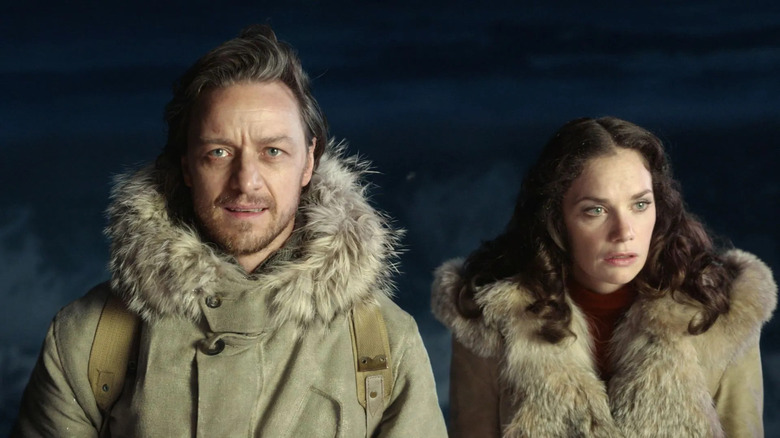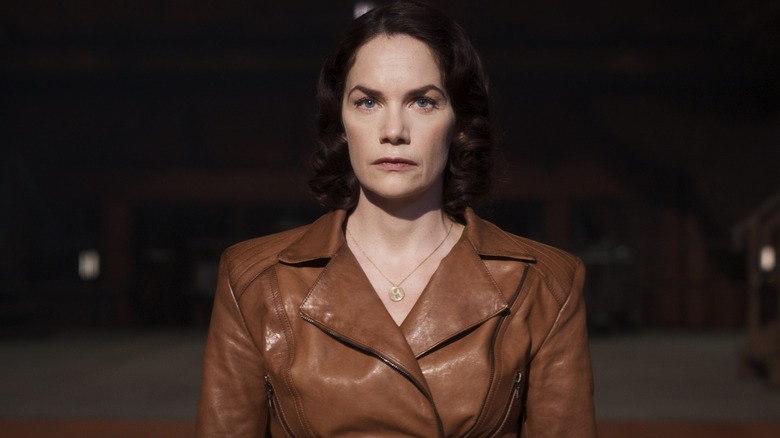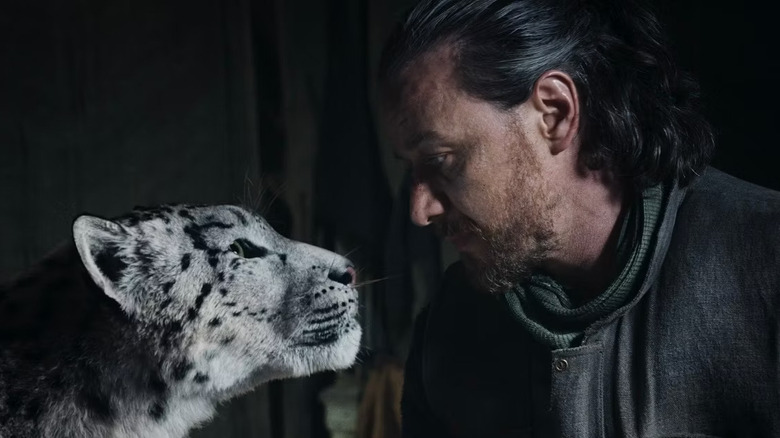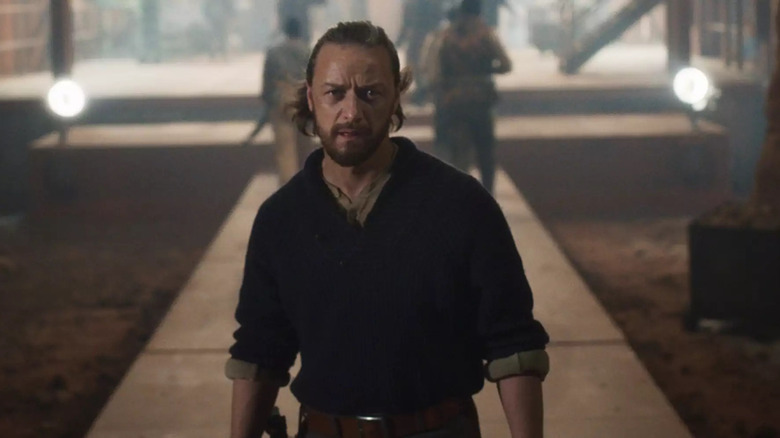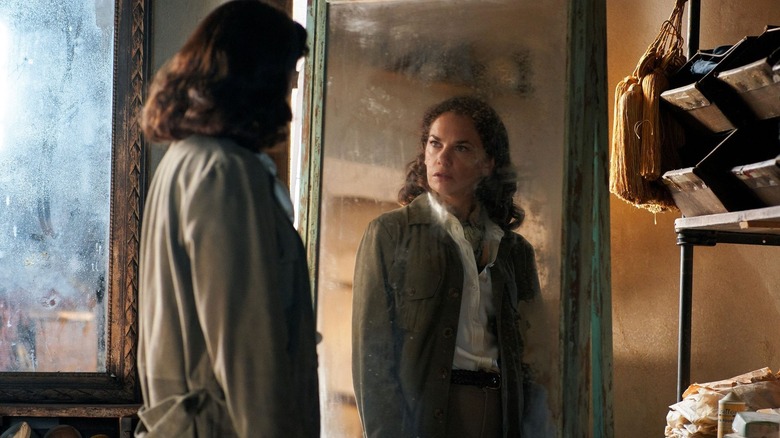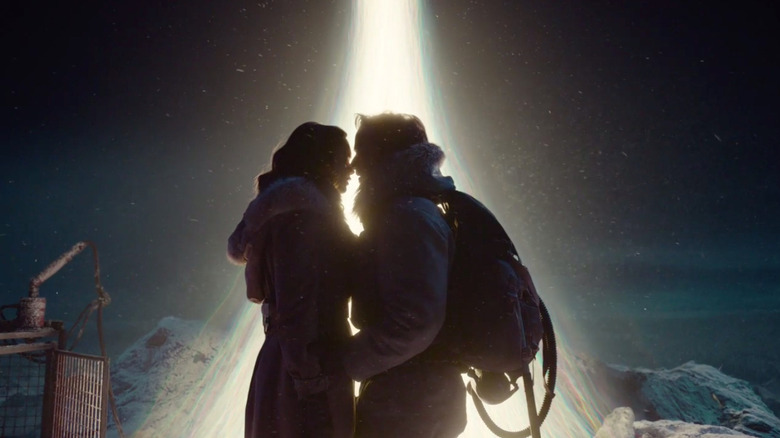His Dark Materials: James McAvoy And Ruth Wilson On Season 3 And Living Up To The Books [Exclusive Interview]
After a two year wait, "His Dark Materials" finally returns to HBO tonight. The series, which is based on Philip Pullman's trilogy, is back for its third and final season, and it looks to be the most epic one yet. Fans of the books may have an idea of what's coming, but there will still be some surprises in store as things come to a head. What began as a coming of age tale about a young girl in a fantastical world has evolved into an all-out war on God to save free will itself. On the front lines of this battle are Lord Asriel and Marisa Coulter, played by James McAvoy and Ruth Wilson, respectively.
After being almost entirely absent from the show's sophomore outing, McAvoy makes his triumphant return this season. As for Wilson, she has taken her character, Mrs. Coulter, on quite a journey, making her more compelling than ever. /Film had the opportunity to sit down with the actors to discuss the new season, what they can relate to in their villainous characters, and even what their daemons would settle as.
This interview has been lightly edited for clarity and brevity.
'Weirdly, I found that something that I could identify with'
You are both playing these fairly villainous roles, particularly early on in the show, but Marisa and Asriel go through some major changes by the end of the series. What about each of these characters did you find yourselves relating to the most?
McAvoy: Ooh, that's a good one. You, Ruth, what do you think?
Wilson: Not a great deal, but I think I can understand the idea of, I suppose — we were talking actually just a minute moment ago about Lyra being underestimated. I think that I can sometimes understand women being underestimated in a male-dominated world. So I think early on in the show, I could understand that — how it feels when people don't expect you or don't want you to be smart, clever, or they have an idea what that is. So I can understand that, I think. But apart from that, not sure what else. [laughs]
McAvoy: I think I can identify with Asriel's — I mean, I wouldn't go these places, I wouldn't go so far, I don't think. But he's tried to do something really, really good and he's willing to go to any lengths and any means to get it done. And I think we've all been in places where we're going, "This is not a bad thing that I'm trying to achieve. Should I do this one thing which will achieve it, even though it's probably not right? I'm going tread on someone or really hurt something or hurt someone or going to contravene some moral, even if nobody ever f****** finds out." I think we've all had those moments on tiny micro levels. He's doing it on a macro, metaphysical, theological level. But weirdly, I found that something that I could identify with in sort of, if I was a different kind of person with a different kind of prospect in front of me, I could easily make those decisions as well. That's quite something, considering it's a character who kills a little boy and I just said that, so that's interesting.
'The enigma of Coulter and the absence of Asriel'
Well, conversely, this might be a little easier to answer. Was there a certain aspect of the character that you had a particularly tough time wrapping your brains around?
Wilson: Yes, quite a lot. Some of it was also to do with the concepts in the show, which are really quite large and wild. So to get your head around what Philip's discussing about dust and all that stuff, I'm like, "I got to work out what this is." We were just talking [about how] I've worked her out now, but during it, there were sorts of things I hadn't really worked out. She kept revealing herself to me, but it wasn't like I had a clear idea of why she did what she did. I think it's really difficult to wrap your head around and to understand. I went into a big backstory, which Philip never did on a page. He never explained these characters. So there was a sense of you trying to work it out or put some things in place that would make sense of it. I love that challenge, though. That's the best thing of it. It's like you're using your imagination to think why this woman would do such horrific things and just putting little clues in the show to suggest that. But I think it's the same with you, James, probably. It's like, "Who is this person, really?" It's not ever really explained.
McAvoy: No, there's so much left unexplained. Almost the enigma of Coulter and the absence of Asriel are defining about the pair of them. So what do you do when she stops becoming an enigma in season 3 and he stops being absent in season 3? Our defining, our key attributes are shattered. So what you going to do?
And you've kind of got to bring something extra now because the book does a lot — I don't know about with Ruth's character — but the book does a lot for Asriel, without him doing anything. Everybody's always like, "Oh my god, Asriel. Did you hear about Asriel?" And it's like, "Wow, great. There must be this amazing thing happening wherever Asriel is." And then season 3 comes on and you're like, "F***, we've got to actually bring it." That was daunting, especially because even in book 3, Philip doesn't really give you too much to work with as Asriel in terms of action or active moments.
That's true.
McAvoy: So there was a lot of invention, and even when we did invent stuff and even when we lifted stuff straight from the book, they weren't active moments of active storytelling or active action that drove the narrative. So there was a lot of work done trying to make that happen. And it was actually wonderful to be a part of, but it was traumatic at times, as well.
'I'm so precious about this material'
Well, it's interesting that you bring that up because I did have a question for you, James, about how Asriel's role in the early part of the story has been somewhat expanded for the show. And I did read that you're a huge fan of the books. So, were you excited about all that great new stuff to play and does your love of the source material make you feel protective over it when changes are made?
McAvoy: Massive. Massively so. I was so excited to be a part of it. Season 2, we were going to do a whole new story. It was a standalone novella of what happened in Cittàgazze when he went through into a populated — the Spectres were around, but they were just something they had been living with for hundreds of years, just a little bit like rats. But before the Spectres drove out all the adults and stuff like that and then having been part of the evacuation of Cittàgazze. So, it was really exciting. That went south with the pandemic.
I read about that.
McAvoy: Yeah, but then season 3, getting to do that in essence with each episode, because, really, there wasn't enough material of Asriel to really fit him into the season. But there was a lot of stuff that he must be doing to make the broader narrative progress. So we were able to flesh that out and expand upon it. But there were moments where I was like, "If I'm not driving the narrative forward in this moment, I don't want to be in this scene and you might as well just cut it. If this is cuttable, if you were able to tell this story without this scene in it, why are we putting Asriel in this? Why are we making a new Asriel scene just to fill time or whatever?"
So I was quite brutal with everybody on that. I hope they didn't mind me being like that. They were brutal back with me when I was being to gobby or too lippy. But I think that we all had actually a deep love of the material, and for me, I felt like the custodian of the integrity of that character as well, which I think you always are as an actor. But I don't know, for this one, I'm so precious about this material. I love it.
'I think loads of clues are on the page'
Understandable. And Ruth, your Mrs. Coulter is brilliant, though somewhat different from the Marisa Coulter of the books and she's really taken on a life of her own. How much of that was on the page and how much of it was in your interpretation of the character?
Wilson: I think loads of clues are on the page, like I said, in a way, similarly, Mrs. Coulter and in book 2, she's not in it that much. And they had her in every episode. So again, it was like we had to create — you've got more space to put her on the screen, and if you've got more space to put on the screen, then like James says, you either have to make it driving the plot or you have to make it character-based. So it was a, "Let's dig into who this woman is then, or put her in scenarios that don't exist on the page that Philip gave us the freedom to do." Which meant you had to explore her more and get more psychological with her. Personally, that's what I felt I had to do with it, is that you had to not explain why she is who she is, but give a few more clues or just explore it.
'Those scenes felt very fueled to me'
So much of the history between Asriel and Marisa has taken place off screen. Does that make it more difficult to prepare for really intense scenes between them?
McAvoy: No, it made it more necessary and it fueled — it meant there was going to have to be more stuff in that scene. Because we're having to tell the story of all that history, of all the contained, bottled-up frustrations and love and affection and –
Wilson: Triangles.
McAvoy: Yeah, all of it. You got to carry all that which, and I think Ruth's a f****** great actor and I think I'm pretty good. If you're good enough to be able to hold all that, then that's fuel. It's not pressure to tell too much story. It's like you've got more story to tell, so it's more fuel. You know what I mean? Those scenes felt very fueled to me.
Wilson: They felt juicy because there's loads in there.
What do you think your daemons would settle as?
Wilson: Well, a new one, James? Or say the same old? I'm going to say the same old, which is an urban fox.
McAvoy: I think my daemon would spent most of my teenage years as a cat of some description, and then it would finally settle as a sea otter.
"His Dark Materials" season 3 premieres on HBO on December 5, 2022.
